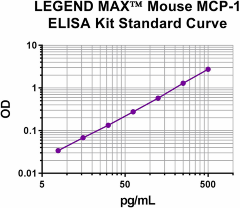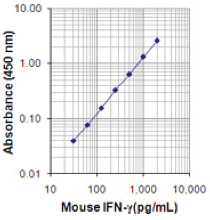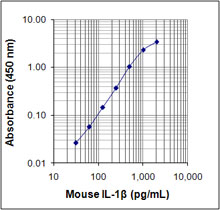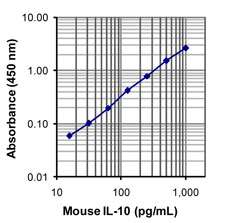- Regulatory Status
- RUO
- Other Names
- Monocyte chemoattractant protein-1 (MCP1), Monocyte chemoattractant and activating factor (MCAF), JE, Small inducible cytokine A2 (SCYA2), HC-11 (HC11), P6, Smooth muscle cell chemotactic factor (SMC-CF, SMCCF), CCL2, MCP-1 Precoated ELISA Kit
- Ave. Rating
- Submit a Review
- Product Citations
- publications

-

Representative LEGEND MAX™ Mouse MCP-1 standard curve. -

Pooled serum and plasma samples from 4 different mouse strains were quantified using the LEGEND MAX™ Mouse MCP-1 ELISA Kit.
| Cat # | Size | Price | Quantity Check Availability | Save | ||
|---|---|---|---|---|---|---|
| 446207 | 1 Pre-coated Plate | $462 | ||||
Mouse MCP-1, also known as CCL2, is a member of the CC chemokine family. It is widely expressed in endothelial cells, smooth muscle cells and monocytes in response to several atherogenic stimulants such as CD40 ligand, platelet derived growth factor (PDGF), interleukin-1β (IL-1β) and oxidized low density lipoprotein. Several recent in vivo studies have disclosed critical roles of MCP-1 in atherosclerosis. In addition, MCP-1 has been implicated in monocytic infiltration of tissues during several inflammatory diseases, and has been implicated in macrophage-mediated tumor growth suppression in mice. MCP-1 has been shown to have direct effects on tumor cells in an autocrine and paracrine fashion in multiple cancers, including breast, lung, cervical, ovarian, and prostatic. In addition, MCP-1 plays a key role in the regulation of MMPs during transmigration.
MCP-1 has been described as a new diagnostic marker and therapeutic target for progressive renal injury in diabetic nephropathy. Kidney epithelial cells, including glomerular podocytes and tubular cells make MCP-1 in response to high glucose and advanced glycation end products. MCP-1 promotes inflammation and progressive injury in diabetic kidneys.
The BioLegend LEGEND MAX™ Mouse MCP-1 ELISA Kit is a Sandwich Enzyme-Linked Immunosorbent Assay (ELISA) with a 96-well strip plate that is precoated with a hamster monoclonal anti-mouse/human/rat MCP-1 antibody. The detection antibody is a biotinylated goat polyclonal anti-mouse MCP-1 antibody. This kit is specifically designed for the accurate quantitation of mouse MCP-1 from cell culture supernatant, serum, plasma, and other biological fluids. This kit is analytically validated with ready-to-use reagents.
Kit Contents
- Kit Contents
-
- Anti-Mouse MCP-1 Pre-coated 96-well Strip Microplate
- Mouse MCP-1 Dectection Antibody
- Mouse MCP-1 Standard
- Avidin-HRP
- Assay Buffer A
- Wash Buffer (20X)
- Substrate Solution F
- Stop Solution
- Plate Sealers
Product Details
- Verified Reactivity
- Mouse
- Application
-
ELISA
- Sensitivity
- 1.33 pg/mL
- Standard Range
- 7.8-500 pg/mL
- Materials Not Included
-
- Microplate reader able to measure absorbance at 450 nm
- Adjustable pipettes to measure volumes ranging from 1 µL to 1,000 µL
- Deionized water
- Wash bottle or automated microplate washer
- Log-Log graph paper or software for data analysis
- Tubes to prepare standard dilutions
- Timer
- Plate Shaker
- Polypropylene vials
Antigen Details
- Biology Area
- Immunology, Neuroinflammation, Neuroscience
- Molecular Family
- Cytokines/Chemokines
- Gene ID
- 20296 View all products for this Gene ID
- UniProt
- View information about MCP-1 on UniProt.org
Related FAQs
- In your LEGEND MAX™ ELISA Kits, there is a step that calls for washing the plates before adding sample. What is the purpose of this step?
-
We typically use a stabilizer for pre-coated plates. The additional washing step is designed to remove these components before you start the assay. If you do not perform the washing, the effect on assay performance is negligible.
- I have multiple LEGEND MAX™ ELISA kits that I want to run simultaneously. Can I use the same wash buffer for all the kits?
-
The wash buffer provided in all our LEGEND MAX™ kits is the same and the part numbers on the wash buffer bottles in these kits should be identical. For ELISA MAX™ Deluxe and ELISA MAX™ Standard Sets, we provide a recipe for the wash buffer on each kit’s technical data sheet. This recipe is the same for all ELISA MAX™ sets.
- For some of your ELISA kits, why do my serum samples require dilution with assay buffer?
-
In some cases, dilution with assay buffer is required to minimize the matrix difference between the samples and the standards to achieve better accuracy.
 Login/Register
Login/Register 












Follow Us